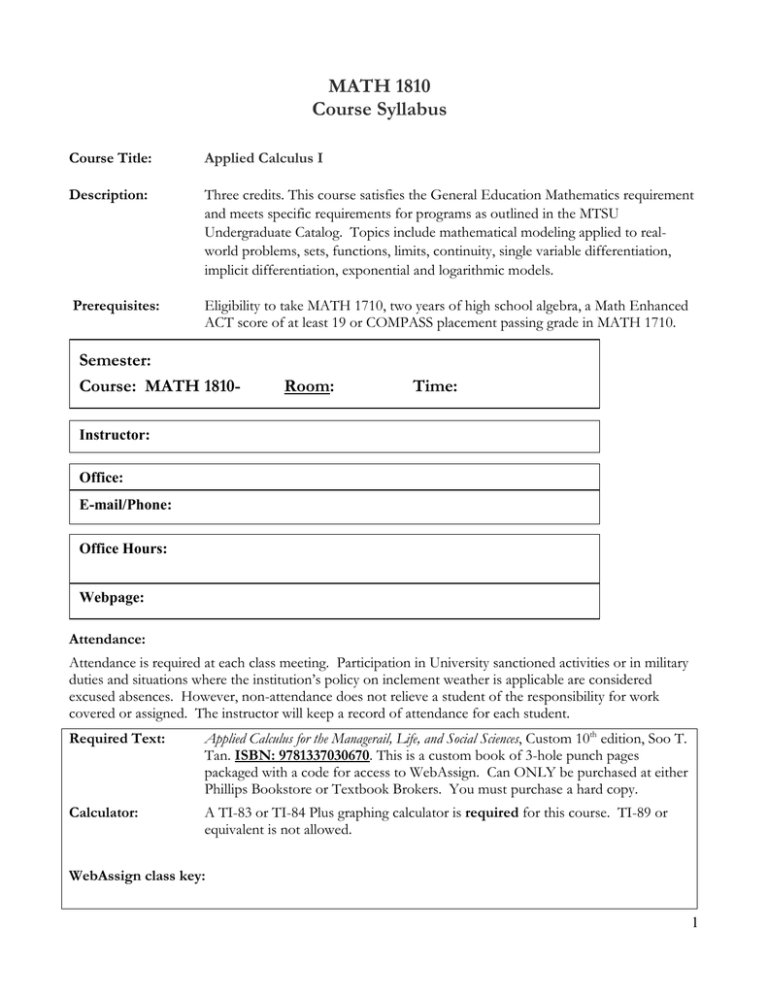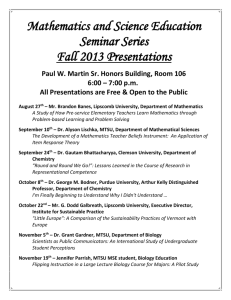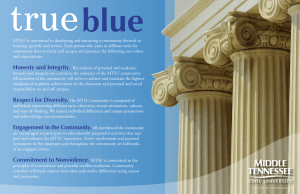MATH 1810 Course Syllabus
advertisement

MATH 1810 Course Syllabus Course Title: Applied Calculus I Description: Three credits. This course satisfies the General Education Mathematics requirement and meets specific requirements for programs as outlined in the MTSU Undergraduate Catalog. Topics include mathematical modeling applied to realworld problems, sets, functions, limits, continuity, single variable differentiation, implicit differentiation, exponential and logarithmic models. Prerequisites: Eligibility to take MATH 1710, two years of high school algebra, a Math Enhanced ACT score of at least 19 or COMPASS placement passing grade in MATH 1710. Semester: Course: MATH 1810- Room: Time: Instructor: Office: E-mail/Phone: Office Hours: Webpage: Attendance: Attendance is required at each class meeting. Participation in University sanctioned activities or in military duties and situations where the institution’s policy on inclement weather is applicable are considered excused absences. However, non-attendance does not relieve a student of the responsibility for work covered or assigned. The instructor will keep a record of attendance for each student. Required Text: Applied Calculus for the Managerail, Life, and Social Sciences, Custom 10th edition, Soo T. Tan. ISBN: 9781337030670. This is a custom book of 3-hole punch pages packaged with a code for access to WebAssign. Can ONLY be purchased at either Phillips Bookstore or Textbook Brokers. You must purchase a hard copy. Calculator: A TI-83 or TI-84 Plus graphing calculator is required for this course. TI-89 or equivalent is not allowed. WebAssign class key: 1 Purpose: This course is designed to help students develop bask skills and concepts in applied calculus. It introduces the notion of the limit of a function and applies the idea to the definition of derivative and integral. Learning Outcomes: Upon completion of this course with a passing grade, the student will: • Have a clear understanding of functions. • Have the ability to calculate the derivative of a function utilizing its definition, formulas derived from the definition of the derivative, and previously known derivatives of component functions. • Have the ability to apply derivatives to the approximation of function values, to sketching (including increasing-decreasing behavior, optimization, concavity and inflection points) and to solving problems modeled by functions. • Have a clear understanding of the definite integral-its definition, calculation and application using antiderivatives and the Fundamental Theorem of Calculus. TBR General Education Mathematics Goal & Learning Outcomes: TBR Goal: The goal of mathematics is to expand students’ understanding of mathematics beyond the entry-level requirements for college and to extend their knowledge of mathematics through relevant mathematical modeling with applications, problem solving, critical thinking skills, and the use of appropriate technologies. TBR Learning Outcomes: Upon completion of this course, students will demonstrate the ability to: 1. Use mathematics to solve problems and determine if the solutions are reasonable. 2. Use mathematics to model real world behaviors and apply mathematical concepts to the solution of real-life problems. 3. Make meaningful connections between mathematics and other disciplines. 4. Use technology for mathematical reasoning and problem solving. 5. Apply mathematical and/or basic statistical reasoning to analyze data and graphs. Course Requirements: In order to accomplish the learning outcomes of this course, the learner is required to: · Attend class lectures · Participate in class activities · Read and study assignments · Solve assigned problem sets · Complete test, quizzes, homework, etc. · Complete a comprehensive final exam If you do not take the final exam, you cannot pass the course. 2 Course Topics: This course consists of selected topics from Chapters 1, 2, 3, 4, and 5 in the required text, including preliminaries, functions, limits and the derivative, differentiation and applications of the derivative, optimization and integration. Sections to Be Covered: Chapter 1—Preliminaries: Sections 1.1-1.9 Chapter 2—Functions: Sections 2.1-2.7 Chapter 3—Limits and Derivative: Sections 3.1-3.4 Chapter 4—Differentiation and Applications of the Derivative: Sections 4.1-4.5 Chapter 5—Optimization and Integration: Sections 5.1-5.5 Course Evaluation and Grading: 1. Chapter 1 Preliminaries: Three Mastery Modules are provided as homework assignments 1.1-1.9 in WebAssign. Each module MUST be completed with at least 80% mastery. If you are unable to complete these preliminary modules with at least 80% mastery, then you are strongly encouraged to consider dropping the class. The dates for completion of the mastery modules are scheduled in WebAssign as follows: Mastery Module 1 2 3 Mastery Topics: Real numbers/Multiplying polynomials Factoring polynomials Rational expressions/Integral exponents Solving linear equations/Rational exponents and radicals/Solving quadratic equations and inequalities by factoring Mastery Topics Covered in Sections: 1.1 and 1.2 Due Date: 1.3, 1.4 and 1.5 September 6th 1.6, 1.7, 1.8 and 1.9 September 13th August 30th You may not move to successive homework for sections 1.1-1.9 until previous homework section is completed with at least 80%. 2. WebAssign homework average – 10% 3. WebAssign practice tests average – 10% 4. Attendance average – 10% 5. Test average – 50 % 6. Comprehensive final exam score – 20% Grading Scale: A: 90-100%; B: 80-89%; C: 70-79%; D: 60-69%; F: Below 60%. NOTE: The final will only be given at the time noted below (under important dates) in the regular class meeting room. Any student who misses the final exam will automatically be assigned the grade of F. 3 Important Academic Dates: Last Day to drop without a grade: September 6th Last Day to drop with a W: October 28th Final Exam Time and Date: TEST DATES: Test 1 Date: Chapter 2 Test 2 Date: Chapter 3 Test 3 Date: Chapter 4 Test 4 Date: Chapter 5 Judicial Statement/Academic Misconduct Academic misconduct is defined as plagiarism, cheating, fabrication, or facilitating any such act. For purposes of this section, the following definitions apply: (1) Plagiarism. The adoption or reproduction of ideas, words, statements, images, or works of another person as one’s own without proper acknowledgment. (2) Cheating. Using or attempting to use unauthorized materials, information, or study aids in any academic exercise. The term academic exercise includes all forms of work submitted for credit or hours. (3) Fabrication. Unauthorized falsification or invention of any information or citation in an academic exercise. (4) Facilitation. Helping or attempting to help another to violate a provision of the institutional code of academic misconduct. Academic misconduct will result in actions taken as defined by the MTSU code of Academic Integrity. A complete description of this code can be found at www.mtsu.edu/judaff. In addition to other possible disciplinary sanctions that may be imposed through regular institutional procedures as a result of academic misconduct, the instructor has the right to assign an F or a zero for the work in question, or to assign an F for the course. If a student believes he or she has been falsely accused of academic misconduct, and if his or her final grade has been lowered as a result, the student may appeal the case through the appropriate institutional procedures. 4 Drop/Withdrawal Policy and Dates Please note the Drop Policy and Withdrawal Procedures as they are stated in the Current Registration Guide. A grade of “I” will be given only in accordance with University Policy. No grade of “W” will be assigned after the official drop date except in situations involving extreme extenuating circumstances beyond the student’s control. In particular, a “W” will not be granted merely because the student is failing. Students should be aware that missing the official drop date and thereby receiving an “F” can have ramifications on financial aid. General conduct in class The instructor has primary responsibility for control over all classroom behavior and can direct the temporary removal or exclusion from the classroom of any student engaged in disruptive conduct or conduct which otherwise violates the general rules and regulations of MTSU. Lottery Scholarship Policy: Do you have a lottery scholarship? To retain the Tennessee Education Lottery Scholarship eligibility, you must earn a cumulative TELS GPA of 2.75 after 24 and 48 attempted hours and a cumulative TELS GPA of 3.0 thereafter. A grade of C, D, F, FA, or I in this class may negatively impact TELS eligibility. If you drop this class, withdraw, or if you stop attending this class you may lose eligibility for your lottery scholarship, and you will not be able to regain eligibility at a later time. For additional Lottery rules, please refer to your Lottery Statement of Understanding form (http://www.mtsu.edu/financial-aid/forms/LOTFEV.pdf) or contact your MT One Stop Enrollment Counselor (http://www.mtsu.edu/one-stop/counselor.php). Math Tutoring Lab (MTL): Math tutoring for this course is available as a free service to MTSU students in KOM 252. Tutoring is conducted by Graduate Teaching Assistants (GTAs), work study students, and a faculty coordinator. The lab is closed on weekends and scheduled MTSU holidays. The hours of operation are posted in the lab. More information is available at http://mtsu.edu/math/students.php#tutoring Reasonable Accommodations for Students with Disabilities: Reasonable Accommodations for Students with Disabilities: Middle Tennessee State University is committed to campus access in accordance with Title II of the Americans with Disabilities Act and Section 504 of the Vocational Rehabilitation Act of 1973. Any student interested in reasonable accommodations can consult the Disability & Access Center (DAC) website www.mtsu.edu/dac and/or contact the DAC for assistance at 615-898-2783 or dacemail@mtsu.edu 5


